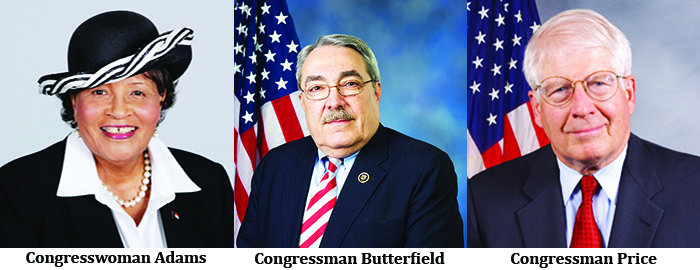
Adams, Butterfield and Price Blast DOJ Voting Records Subpoena

By CASH MICHAELS
Even though the Trump Administration says it will not legally require voting records from North Carolina until next year, all three of the state’s Democrat congresspersons have expressed outrage, and promise to fight the request.
North Carolina Congressional members Alma Adams (D-NC-12), David Price (D-NC-4) and G.K. Butterfield (D-NC-1) – the only Democrats in the state’s thirteen-member congressional delegation – say they see political shenanigans in the federal subpoenas from the US Dept. of Justice [DOJ], and specifically from U.S. Attorney for the Eastern District Robert Higdon, demanding voting records from 44 Eastern North Carolina counties and the State Board of Elections.
Many of those counties have significant Black voter populations.
The records would cover an eight-year period and literally millions of pieces of documented voter data, state election officials say. The federal subpoenas, reportedly part of an investigation by U.S. Immigration and Customs Enforcement, and the U.S. Department of Homeland Security, in association with a Wilmington grand jury probe that recently charged 19 foreign nationals with voter fraud in the 2016 elections.
Nine of the defendants were charged with falsely claiming U.S. citizenship in order to register to vote.
Those records were originally required to be turned over from the State Board of Elections by Sept. 25th, but after a major uproar from North Carolina officials, especially given that the Nov. 6th midterm elections are less than 60 days away, DOJ backed off of that date, later saying that compliance with the federal subpoenas could wait until January 2019.
DOJ added that it is not interested in who North Carolinians voted for on their ballots, and in fact, may not need completed ballots for its probe.
Still, the federal request is not going over very well.
“These subpoenas are overly broad, request private voter information, and appear to target voters of color,” a letter last week from Congressional members Butterfield, Price, and Adams, along with other Democrat House members, to the inspector general of the U.S. Dept. of Justice, stated. “Accordingly, we respectfully request that you undertake an investigation to examine the circumstances by which these subpoenas were issued, the scope of the subpoenas, and the seemingly political motivations behind them.”
The letter continued, “It is no surprise that the subpoenas target North Carolina’s voter rolls, as the state has a history of voter suppression. In 2016, a federal appeals court struck down North Carolina’s voter identification law, finding that the law “target[ed] African-Americans with almost surgical precision” in order to lower turnout among African-Americans. Despite this decisive ruling; Republicans in North Carolina are continuing to push a constitutional amendment that would require photo identification at the polls.”
“At a time when DOJ should be investigating voter suppression, it appears that the Department is instead supporting it,” the Congressional missive maintained. “In the subpoenas issued here, there is again an obvious targeting of minority voters. The 44 counties that received subpoenas account for approximately 46% of the state’s registered Black voters, 39% of the state’s registered Hispanic voters, and 36% of the state’s registered White voters.[6] This appears to be an effort designed to disproportionately target minority voters and depress voter turnout. At a minimum, this apparent disproportionate targeting of minority voters may raise potential equal protection and due process concerns.”
“The subpoenas may have additional legal implications. Under the National Voter Registration Act, each state must “ensure that the identity of the voter registration agency through which any particular voter is registered is not disclosed to the public. Presumably, the massive data set requested by DOJ would reveal the agency where a voter was registered. Moreover, the request for absentee ballots, which are potentially traceable to the specific voter who cast the ballot, is a violation of every voter’s right to cast a secret ballot.”
“Though DOJ has delayed the production deadline until after the November election, the subpoenas still raise many questions about their legality and true motivations.”
The letter concluded, “Given what we know about the scope of the subpoenas, and the counties that were targeted, we are concerned that this could be part of the Trump Administration’s dangerous and anti-democratic strategy of voter suppression and intimidation to limit equal access to the ballot box.
“We hope that you will promptly launch an investigation to determine the legal implications of and rationale for these subpoenas.”